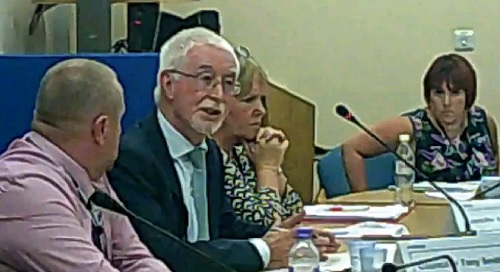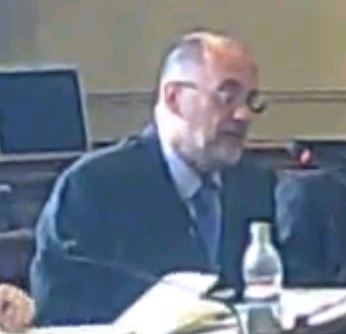A fictional conversation with our own legal department about Lyndale and other matters

Legal department: You’re skating on thin ice you know. That article you published last Friday morning about the ~£2.7 million valuation of Lyndale School months before the decision over closure probably led to an article in the local newspaper/website called the Wirral Globe by Emma Rigby carrying quotes from various well-known people and well you’re causing trouble again.
John Brace: Yes I know I wrote it. So your point is?
Legal department: You cause us enough stress and sleepless nights as it is without adding to it. You remember that letter you wrote to Wirral Council?
John Brace: Yes. How can I forget it as I had a hand in it and published it?
Legal department: And you remember our advice at the time?
John Brace: Yes. Although thankfully nobody can FOI us for legal advice unlike our modern “open and transparent” Wirral Council and Surjit Tour’s advice to councillors on the Lyndale matter which I was slightly shocked they actually released in response to a FOI request.
Legal department: Now, there you go again! Don’t you know when you stop?! We know you’re a good at what you do but there are frankly limits to this you know! What does it take to keep your mouth shut for once!? Why are you meddling in the Lyndale matter again and making waves yet again? Just let it be!
Write about bin collection and Biffa, a consultation on closing children’s centres, Birkenhead Market and the Traffic Regulation Order issue, New Brighton & Neptune, golf (there’s an awful lot you could write about golf), councillor’s expenses, job cuts, even Kevin Adderley if you have to but please anything apart from Lyndale School! Please!!!
John Brace: Because the public have a right to know! Plus there are sound commercial reasons for doing so due to the demographic makeup of our readers/viewers.
Legal department: *sighs* Well let someone else tell them then! There are some things you just shouldn’t put in the public domain or draw attention to at this stage.
Please don’t write anything more about Lyndale connected to that letter. That is the advice.
John Brace: For how long?
Legal department: Just steer clear of anything specific with regards to that letter for obvious reasons!!!
John Brace: But even if the case was “active” (which it isn’t) s.5 of the Contempt of Court Act 1981 c.49 allows for “a publication made as or as part of a discussion in good faith of public affairs or other matters of general public interest” …. “if the risk of impediment or prejudice to particular legal proceedings is merely incidental to the discussion.”
Legal Department: Look you indeed wrote the policy on this about keeping your mouth shut when it comes to legal matters. It complicates things. You know the reasons why.
If you write too much before a matter is even put before a court, it tips off the other side in the case as believe it or not people involved with Wirral Council read your blog and the last thing you want to do is complicate things that are complicated enough.
John Brace: True I did. For extremely sound reasons. Thanks for reminding me. However I also wrote an editorial override in that policy which requires two people to agree.
Legal Department: Well you don’t have the approval of two people yet (thankfully). The matter has been somewhat complicated by the call in anyway as the Cabinet decision will now not be implemented until a further meeting of the Coordinating Committee.
John Brace: Who’s the lead signatory?
Legal Department: Councillor Paul Hayes. However 27 other councillors have also called it in.
John Brace: Wow must be a record, so you’re saying write about other stuff?
Legal Department: Yes, or limit yourself on Lyndale to writing just about other people or just merely reporting the facts of what’s going on, preferably facts that are already in the public domain.
John Brace: So for example starting on a transcript of the Cabinet meeting on 4th September 2014 about Lyndale School for the hard of hearing?
Legal Department: That’s ok, as we have protections under libel laws from reporting on public meetings at Wirral Council which is referred to as “qualified privilege”. Anyway there’s already been a request for that. You’ve got a bit behind with subtitling videos anyway.
John Brace: But nobody’s ever threatened us with libel over Lyndale School, just about the Chief Executive’s email about the golf (later withdrawn) but I take your point about subtitling.
Legal Department: Yes, but the impression in some quarters is that you’re putting a bunch of highly inconvenient truths out there in the public domain about Lyndale School that could be easily used for party political purposes (and have been).
John Brace: Oh come on, a politician and party members at the report produced as a result of my disciplinary panel hearing said I was writing a “little read blog” or words to that effect. I’m not really that influential.
Legal Department: Exactly, but that was three years ago. Comparing September 2014 to September 2011 is like comparing apples with pears. There are thousands of people reading this blog each month now, compared with only hundreds of people a month back in September 2011. This is party because since leaving the Lib Dems you’ve spent more time at your “day job”.
Things have changed. Politicians disliked you even back then for telling the public the truth as you saw it as to what was really happening and the Lib Dem ones ended up getting somewhat censured as a result for using Wirral Council resources for party political purposes. Remember what happened to Martin Morton? Don’t end up like him!
Understandably they wanted to bury the truth (which was tied in to a conspiracy of silence on Martin Morton/Anna Klonowski/another disability matter and corporate governance issues) and cover things up for party political reasons. Even though all but one of the things that you were actually accused of were false, therefore the suspension wasn’t legitimate but as a Lib Dem politician (and former Lib Dem politician) had said this to their fellow Lib Dems they could hardly turn round and admit that any of their former politicians told lies (even though they may say that in private) could they? As you well knew at the time, they decided it was best to keep you in the party as a way to control you, as even at that stage you knew too much and you were becoming a nuisance to those in power as how they wanted things to play out.
Yours and Leonora’s resignation from the Lib Dems in January 2012 was somewhat unexpected, but resolved an ongoing conflict of interest about reporting on Lib Dem politicians and let’s face it Labour got exactly what they wanted out of this as four months later when they got a majority on Wirral Council.
Even the version of events that everybody actually agreed upon at your disciplinary panel hearing back in September 2011 was so extremely damaging to the reputation of the Lib Dem Party itself so they understandably took the “shoot the messenger”/ “rewrite history” approach and they took it out on you (as you must have expected on some level that they would do so and if you didn’t perhaps as the youngest party member in Birkenhead you needed to “grow up” and let’s face it one of the older party members at that meeting that made the decision had referred to you as a “baby” in a previous meeting which of course is not “ageist” is it?).
Your attempts at somewhat humourous comments during that meeting (which according to their own constitution and later concluded lawsuit was indeed a flagrant breach of their own party’s constitution to even hold (as you pointed out to them at the time but they once again ignored you)) but hey they’re Lib Dems and it seems that their own rules can be twisted by themselves beyond breaking point in an abuse of power) about a dead dog and a shooting at your disciplinary panel, were in extremely poor taste considering two of the people who had been shot at were actually at the meeting itself. It’s a party that would prefer to forget Jeremy Thorpe and how much of a PR nightmare that was for them (even though he was acquitted in a court) and to be honest with you were somewhat goading them into having to explain themselves because they’d been all instructed to keep their mouths shut and stick to a “party line” when you previously had asked them questions.
Let’s face it you sued an entire party (and won) and took a politician to court (and won)! How many people ever do that? Not many! You’re unusual, even when during the meeting in June 2011 when they tried to suspend you your threats of legal action and “seeing them in court” seemed to them like bluster so one of them laughed (which is partly why you got kicked at under the table and then slapped in the face but then people can lose their cool at party political meetings) and even though you later did have the judiciary intervene, your repeated warnings fell on completely deaf ears because they had (especially the politicians) made their minds up as to what to do before the meeting even started and were going to stick to this agreed party line.
That is part of the reason why you weren’t allowed to attend your own disciplinary meeting. By deliberately starting it late, it gave a chance for the decision to be made before the meeting had even started and in a way where you’d have no influence over the outcome.
You know as well as I do that two former Lib Dem councillors were being used as proxies as part of a renewed Labour plot to blacken your name and make things up about you (because let’s face it you were fast becoming a threat to the Labour Party too and deemed to be less of a threat to them if you weren’t a member of another rival political party) Let’s face it Cllr Harry Smith had already had a right moan to both you and the party about you (including a “With Compliments” Wirral Council slip with his letter) about telling the public in a party political publication delivered to the Bidston & St. James area that he wasn’t (when he was Vice-Chair) at a Pensions Committee meeting of Wirral Council at the time when it was reported that the Pension Fund dropped by around £700 million and let’s face it if the Fund drops considerably the difference has to be made up by the taxpayer).
Cllr Harry Smith felt it was terribly unfair that people were going along to his councillor’s surgery and asking him pointed questions about why (even though he was Vice-Chair of the Pensions Committee) that the Merseyside Pension Fund had dropped by so much. Let’s face it it is a fund that affects over a hundred thousand people and even the local newspapers reported it at the time.
If Cllr Harry Smith wishes to go on holiday, miss a public meeting and not even send a deputy along to a meeting and then somewhat unfortunately get suspended as a councillor (in an unrelated matter) for a week for bullying other people, well as we all know from past experience these type of people are exactly the kind of person the Liberal Democrat Party have to take seriously because they’d rather the likes of Councillor Harry Smith were getting irked at someone else instead of at them!
This goes so far as even if it seems like they’re breaking their own party rules by pandering to another political party’s interests in that process because as we all know Lib Dems love their “due process” even if that results in an “abuse of power” or a “court case”.
John Brace: However in perhaps a flagrant breach of etiquette I will say that during that particular meeting and I won’t state who (other than it wasn’t me or Leonora) said that Councillor Harry Smith moaning about someone else for holding him to account was like “the pot calling the kettle black” and let’s face it Cllr Harry Smith has been referred to by one of his fellow Labour councillors as “royalty”.
That is partly why the renewed plot in 2011 had to be done through two Lib Dem proxies.
Let’s face it if you do anything in politics, you will attract more complaints, even fictional ones. If a party spends hours looking into every fictional complaint however trivial it is time that is not spent delivering leaflets or winning elections.
The actual politicians attracted far more complaints than I ever did (even during my brief years as a politician over in Liverpool) and although they never went so far as to suspending them from the party they did exactly the same thing to them in removing them from all committee positions and blackening their name in public. They tried to embarrass them into toeing a party line and it backfired, just look at how disastrous the libraries matter was handled and the resultant public inquiry led by Sue Charteris. It made the fromer Lib Dem politician that said in public that Wirral Council would be “vindicated” by the public inquiry look to be completely wrong.
But let’s face it if they’re taking the likes of the Labour’s Councillor Harry Smith seriously (even his own party has had concerns about him to put it mildly), it is seriously the thin end of the wedge from a party political perspective.
After all once people start getting beaten up and shot at for political reasons, it’s gone well beyond being politics and become the realms of terrorism. It’s moved well beyond merely political debate into law and order issues.
As I know myself from bitter personal experience in that court case the Lib Dems were not on the side of law and order (hence why the whole political party has a County Court court order against it), they have known links to foreign terrorism, which makes them people better not to associate with if at all possible.
This “paragon of virtue” in Councillor Harry Smith, who of course would never do things for party political purposes, is of course the kind of person the Liberal Democrats obviously have to listen seriously to, take his concerns seriously and let’s face it Cllr Harry Smith seriously wanted me out of the way.
He wanted to be reselected by his local Labour branch and complaining about me and eventually many years later persuading the Lib Dem Party to pick someone else in Bidston & Saint James who was less trouble to him (let’s face it how much trouble are you if you finish last in an election?) which they eventually they did in 2012 is all part of what led to Labour getting a majority on Wirral Council. The easiest way for them to achieve this was to destabilise the Lib Dems (which let’s face it wasn’t too hard and such tactics wouldn’t work as well on the Tories).
During that court case in 2011-2012, one of their party (Lib Dem party) employees that was someone high up in the party in fact he was Chief Executive, being paid the same salary as an MP, was around that time serving out his period of notice. Another party member working in party HQ seemed to want to scapegoat him, which I of course meddled in and prevented from happening by making an undefended application to the court and dragging a Judge in the County Court into the whole matter because to be honest by then it had gone beyond the actions of one person by then into an issue about a extremely badly run organisation. The Lib Dem Party of course want to make this former Chief Executive Chris Fox a member of the House of Lords (which let’s face it if one of the two parties of government pick you it’s pretty likely to happen)!
It’s all highly political and highly party political and perhaps a chapter of my life I’d rather forget! I do have a way of holding people to account that is somewhat unusual, highly unpredictable and not always in keeping with the demands of social and political etiquette because I have to sleep at night. It must be my background and training then.
Legal Department: Partly, but that’s still a complete mystery to us because you’re one of those odd people subject to the Official Secrets Act 1989 c.6 we don’t have access to your unredacted personnel file.
John Brace: Ha ha, indeed. Everyone has their secrets eh and you’re right there are things I’d better keep my mouth shut over (for now) after all things can snowball but it’s about time the public knew what really went on in the past but that is a story for another day. At least I got an apology later from one of the Lib Dems, but I suppose the party that extols the virtues of “freedom of speech” until somebody happens to mention something about the Lib Dem Party would accuse me of “breaching confidentiality” if wrote about which one it was! Best not to take politics too personally eh?
If you click on any of these buttons below, you’ll be doing me a favour by sharing this article with other people. Thanks:



